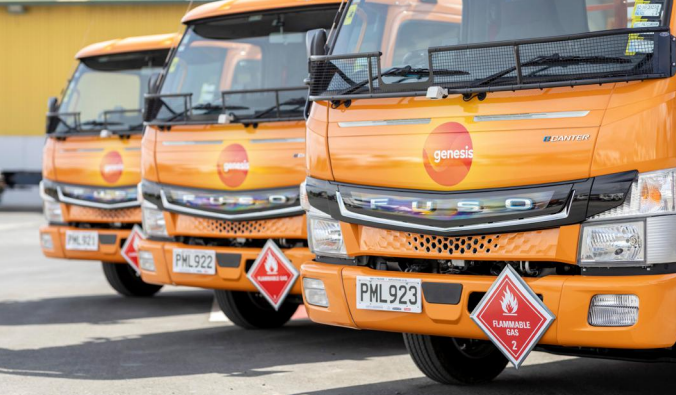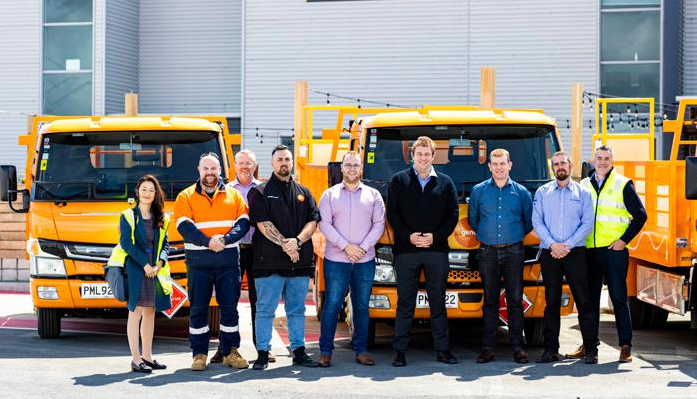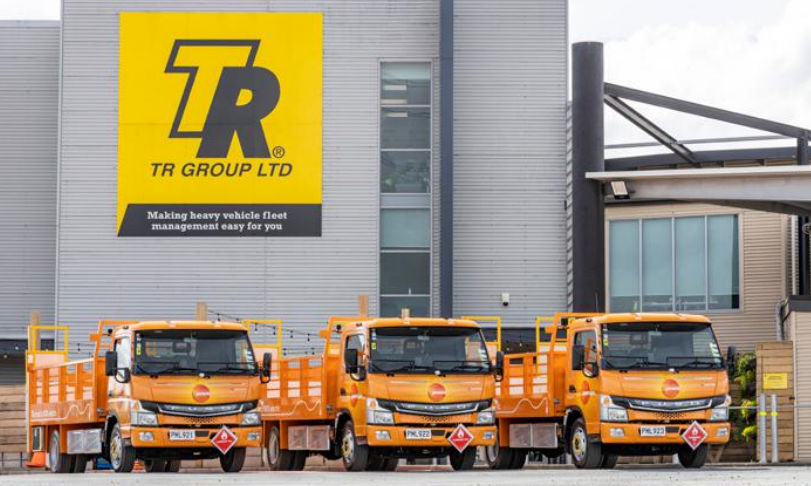
Genesis Energy is putting more Fuso eCanters into its fleet following a year-long trial as the first company in the southern hemisphere to introduce the small battery electric truck.
The company’s first eCanter began work in July last year with support from lease partner TR Group as well as Fuso New Zealand and Keith Andrews Trucks.
It took on the trial itself without any government funding and has been happy to share its findings to help other transport operators as they decarbonise.
This includes feeding its operating data back to Fuso NZ to be used to develop future models.
With around 110 vehicles in its lightduty truck fleet, the eCanter was a perfect fit for trialling battery electric technology.
Transport makes up around 20% of the country’s carbon emissions and in response Genesis says it’s taking steps to reduce its own vehicle emissions.
It has added three extra eCanters for LPG deliveries in Hamilton, Feilding and Christchurch to have a total of four in its fleet with charging stations installed at each of the depots.
The first eCanter was launched in East Tamaki, Auckland, and after using it for several months several insights were gained around range and performance, low speed manoeuvring on steeper terrain like customers’ driveways, and asset ownership structure.
Mapping that data against its distribution routes, Genisis decided the battery electric truck was better suited for another location and it was transferred to the Christchurch metro area.

The company says every diesel truck it replaces with an electric one removes 26.5 tonnes of carbon emissions per year.
Genesis fleet engineering and reliability manager Brad Phillips says the team is really excited to be adding more electric trucks to the fleet.
“The first trial went really well. It’s a really good opportunity to work with Fuso NZ and TR Group.
They’ve been really engaged in the trial and helping us understand the product more and making it work,” he says.
“We’ve talked to a lot of different operators who are interested in moving to EV trucks and it’s all about helping the New Zealand transport industry start its journey towards decarbonisation.” Phillips says the team had to adapt the technology following the first roll-out.
“The first one was operating in Auckland, and we very quickly learned that it works in a flatter environment a lot better, there’s less constraint on it, so we moved it to Christchurch…
“The key is you want them to displace the kilometres that diesels are doing, so where you can optimise your runs and use them the most, you can displace more of that diesel energy,’ he says.
Meanwhile, Genesis senior driver James Moir was at TR Group’s Penrose, Auckland, site as the new eCanter fleet was revealed.
He’s preparing to help with driver training on the new electric trucks and was expecting to make around 30 to 40 deliveries a day with it in Hamilton.
Moir is looking forward to driving an EV and says the other drivers are coming in “with open minds” about the new technology.
TR Group national sales and marketing manager Shane O’Grady says everyone worked closely to make sure the eCanter launch was a success.
TR Group leases the vehicles to Genesis and takes care of everything from managing the body build, inspecting the vehicle before it goes on the road, plus servicing and maintenance.
TR Group now has around 40 electric trucks on the road, most of them eCanters.
Its TR Driver Training initiative helps teach operators about using electric vehicles and their capabilities.
TR has appointed an alternative fuel specialist who oversees developments with battery electric technology, and hydrogen fuel cell technology when that arrives.
“We realised, ‘hey, this is coming, it’s coming quickly’ and we needed a specialist here to lead us on the journey to do the learning and get the feedback from customers,” O’Grady says.
He says the team has been very impressed with the overall operation of its EV truck fleet; only once has one needed towing after running out of juice.
“So far, it’s early days, but from a maintenance and reliability point of view, they’ve been absolutely amazing.
“We’ve been pleasantly surprised with the quality and reliability of these vehicles and they’re a much more relaxing experience for the drivers,” he adds.
O’Grady says simple changes were made to deal with the range factor.
“You fit the work around the truck as opposed to fitting the truck around the work which is kind of the traditional approach which you can do with a diesel vehicle,” he says.
Fuso NZ national sales manager Cameron Childs says the eCanter has been well received by local customers and more will be landing in the country soon.
So far, there are more than 30 of the light duty electric trucks operating throughout the country.
“We’re very excited to have the truck in New Zealand,” he says.
“There are very few countries in the world to have this truck.
Interest here has been strong.” “It has been hugely gratifying to partner with a wide range of transport operators across a wide range of applications for the Fuso eCanter to date.
We invite anyone who wants to start the conversation and benefit from the knowledge we can share to contact,” Childs says.
Companies such as Mainfreight and Toll are operating them for Auckland metro deliveries while transport company Carr & Haslam even has one operating for vehicle deliveries around the city.
Nine eCanters have been delivered in Christchurch to several businesses and in a variety of applications.
The 7.5-tonne eCanter is powered by an 81kWh (420v) lithium-ion, liquidcooled battery pack and provides 3.5 tonnes of payload.
It delivers 135kW of power and 390Nm of torque, which provides a range of up to 150km on a single charge.

The electric drivetrain is fitted to a standard 3.4m wheelbase Fuso Canter cab chassis, meaning customers and bodybuilders work with the same, familiar 750mm wide frame.
A standard CCS2 plug is used for charging, with downtime minimised with DC fast charge capability that has the battery at 80% capacity in less than one hour.
Meanwhile, parent company Mitsubishi Fuso has unveiled the next generation eCanter featuring an expanded line-up of applications plus a new modular battery concept offering different driving ranges.
The company presented the latest model of the truck in a September 7 livestream from its headquarters in Kawasaki, Japan.
It follows five years of operational experience in Europe, North America, Australia, and New Zealand since its launch in 2017 as the first seriesproduced all-electric light-duty truck.
Sales of the next generation eCanter are scheduled in early 2023 in Japan and it will launch in overseas markets in coming years.
Childs says it’s too early to say when the latest models might arrive in NZ and Australia.
“Whatever the timing, we’ll undertake a local validation programme in our unique conditions to ensure a seamless introduction.”








